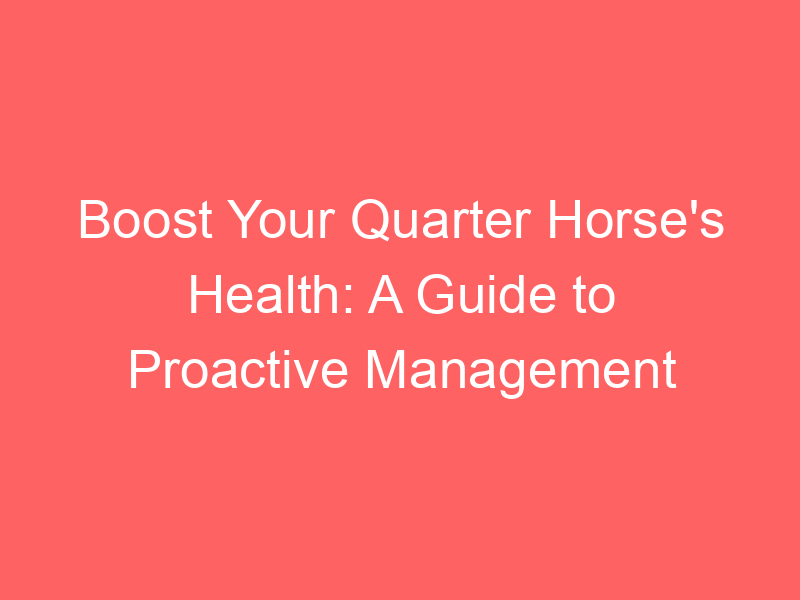
Introduction to Quarter Horse Health
When it comes to the well-being of Quarter Horses, understanding their health is vital. This breed, known for its speed and agility, requires particular attention to maintain its optimal health. This introduction will provide a foundation for understanding the importance of proactive health management and an overview of common health issues in Quarter Horses.
- Understanding the Importance of Proactive Health Management
- Overview of Common Health Issues in Quarter Horses
Proactive health management is all about preventing health issues before they occur. It’s like a shield that protects your horse from illnesses. This approach focuses on regular check-ups, a balanced diet, and adequate exercise. It’s about knowing your horse’s needs and meeting them before they turn into problems.
For example, a study showed that horses with regular vet check-ups had fewer health issues than those without. This shows the importance of proactive health management. It’s not just about treating illnesses; it’s about preventing them.
Despite our best efforts, Quarter Horses can still face health issues. Some of the most common include Laminitis, Colic, and Equine Infectious Anemia. Let’s take a brief look at each:
| Health Issue | Description |
|---|---|
| Laminitis | This is a painful condition that affects the horse’s feet. It can be caused by overeating, too much work, or even a high fever. |
| Colic | Colic is a severe abdominal pain that can be caused by many factors, including diet, stress, and parasites. |
| Equine Infectious Anemia | This is a viral disease that can cause fever, weakness, and even death. It’s spread by blood-sucking insects like flies and mosquitoes. |
Understanding these common health issues can help us better care for our Quarter Horses. Remember, prevention is always better than cure.
Proactive Health Management: A Comprehensive Approach
When it comes to the health of your Quarter Horse, a proactive approach is key. This involves regular vet check-ups, a balanced diet, and consistent exercise. Let’s delve into the importance of regular vet check-ups.
Importance of Regular Vet Check-ups
Regular vet check-ups play a crucial role in maintaining the health of your horse. They help in early detection of potential health issues, ensuring that your horse gets the necessary treatment promptly.
- Role of vet check-ups in horse health maintenance
- Case study: Impact of regular vet visits on Quarter Horse wellness
Vet check-ups are not just about treating illnesses. They are a comprehensive approach to health management. During these visits, the vet can assess your horse’s overall health, monitor its weight, check for any signs of disease, and provide necessary vaccinations. This proactive approach helps to prevent health issues from developing or worsening.
Consider the case of a Quarter Horse named Star. Star’s owner ensured regular vet visits every six months. As a result, a potential digestive issue was identified early during one of these check-ups. Immediate treatment was administered, preventing the issue from escalating into a serious health problem. This case highlights the importance of regular vet check-ups in maintaining the wellness of your Quarter Horse.
In conclusion, regular vet check-ups are an integral part of proactive health management for your Quarter Horse. They help in early detection of health issues, ensure that your horse is up-to-date with vaccinations, and contribute to overall wellness.
Equine Diet and Nutrition
When it comes to maintaining the health of a Quarter Horse, diet and nutrition play a pivotal role. Let’s delve into the specifics of equine nutrition and understand how a balanced diet can contribute to proactive care.
- Understanding the nutritional needs of a Quarter Horse
- Importance of a balanced diet in equine proactive care
The Quarter Horse, known for its speed and agility, requires a diet that supports its high energy levels. A typical Quarter Horse diet consists of hay, grains, and pasture grass. However, the exact nutritional needs can vary based on the horse’s age, weight, and activity level.
| Age | Weight | Activity Level | Recommended Diet |
|---|---|---|---|
| Young | Light | Low | High-quality hay and limited grains |
| Adult | Medium | Moderate | Combination of hay, grains, and pasture grass |
| Senior | Heavy | High | Increased grains and supplements, along with hay and pasture grass |
Remember, it’s essential to provide clean, fresh water and salt blocks to meet the horse’s hydration and mineral needs.
A balanced diet is crucial for the overall health and wellbeing of a Quarter Horse. It helps in maintaining optimal weight, supporting growth and development, and enhancing performance. Moreover, a well-balanced diet can prevent various health issues such as obesity, laminitis, and colic.
It’s important to note that proactive equine care involves more than just providing the right food. Regular exercise, routine vet check-ups, and proper grooming are equally important.
In conclusion, understanding the nutritional needs of a Quarter Horse and ensuring a balanced diet are key steps in proactive health management. With the right diet and care, your Quarter Horse can lead a healthy, active, and fulfilling life.
Exercise and Training
Proper exercise and training are essential components of proactive health management for Quarter Horses. Let’s delve into the role of regular exercise in horse health management and the best practices for training these magnificent creatures.
- Role of Regular Exercise in Horse Health Management
- Key Takeaways: Best Practices for Training Quarter Horses
Regular exercise plays a crucial role in maintaining the overall health of a Quarter Horse. It helps to keep the horse’s weight in check, ensuring that they do not become overweight, which can lead to numerous health issues. Exercise also strengthens the horse’s muscles and bones, making them less prone to injuries. Furthermore, it improves cardiovascular health, boosts the immune system, and helps in digestion.
According to a study conducted by the American Association of Equine Practitioners, horses that engage in regular exercise are less likely to develop health issues such as colic, laminitis, and respiratory problems. Therefore, incorporating a consistent exercise routine into your horse’s schedule is a proactive step towards ensuring their long-term health and well-being.
Training a Quarter Horse requires patience, consistency, and a deep understanding of the horse’s physical and mental capabilities. Here are some best practices to keep in mind:
| Best Practice | Description |
|---|---|
| Consistency | Consistency is key in horse training. Establish a regular training schedule and stick to it. |
| Patience | Horses learn at their own pace. Be patient and give your horse the time they need to understand and respond to your commands. |
| Positive Reinforcement | Use positive reinforcement to encourage desired behaviors. Reward your horse with treats, praise, or a pat on the neck when they perform well. |
| Physical Fitness | Ensure your horse is physically fit before starting any rigorous training program. Regular vet check-ups can help assess your horse’s fitness level. |
Quarter Horse Care: Preventive Measures
One of the most important aspects of caring for a Quarter Horse is taking preventive measures. These measures can help to keep your horse healthy and happy. Let’s take a closer look at two key preventive measures: vaccinations and deworming.
Vaccinations and Deworming
Vaccinations and deworming are two crucial steps in maintaining the health of your Quarter Horse. They play a significant role in proactive equine health and well-being.
- Importance of vaccinations in proactive equine health
- Understanding the deworming process and its role in horse well-being
Vaccinations are a key tool in preventing diseases in horses. They work by preparing the horse’s immune system to fight off specific infections. This is done by introducing a small, safe piece of the disease-causing organism into the horse’s body. The horse’s immune system then learns to recognize and attack this organism, which helps to prevent the horse from getting sick if it is exposed to the disease in the future.
Deworming is another essential aspect of horse care. Horses can easily pick up worms and other parasites from their environment, which can cause a range of health problems. Regular deworming can help to keep these parasites in check and prevent them from causing harm to your horse. The process involves giving your horse a medication that kills the worms. The medication is usually given orally, and the frequency of deworming will depend on your horse’s specific needs and the recommendations of your veterinarian.
In conclusion, vaccinations and deworming are two vital preventive measures in Quarter Horse care. By understanding their importance and ensuring your horse receives these treatments regularly, you can help to keep your horse healthy and happy.
Hoof Care
One of the most important aspects of Quarter Horse health is hoof care. The hooves of a horse are like the foundation of a house – if they aren’t strong and healthy, the rest of the structure suffers. Let’s delve into why hoof care is so crucial and how you can ensure your horse’s hooves stay in top shape.
- Why hoof care is crucial for a Quarter Horse’s health
- Practical tips for maintaining healthy hooves
- Regular Cleaning: Clean your horse’s hooves daily to remove dirt and prevent the buildup of bacteria.
- Professional Check-ups: Have a professional farrier check your horse’s hooves every 6-8 weeks. They can trim the hooves and check for any signs of disease or damage.
- Proper Nutrition: A balanced diet is key to hoof health. Nutrients like biotin, zinc, and omega-3 fatty acids can help promote strong and healthy hooves.
- Exercise: Regular exercise helps improve blood circulation to the hooves, promoting healthier growth.
Hooves are a critical part of a Quarter Horse’s anatomy. They support the horse’s weight, absorb shock when the horse moves, and provide traction. Neglecting hoof care can lead to a variety of health problems, including lameness, abscesses, and infections. According to a study by the American Association of Equine Practitioners, hoof disorders are among the top reasons for horse hospital admissions. Therefore, regular hoof care is not just a matter of grooming; it’s a vital part of maintaining your horse’s overall health.
Maintaining healthy hooves doesn’t have to be a daunting task. Here are some practical tips:
Remember, hoof care is a continuous process, not a one-time event. By incorporating these tips into your regular horse care routine, you can help ensure your Quarter Horse’s hooves stay healthy and strong.
Addressing Health Issues: Early Detection and Treatment
When it comes to the health of Quarter Horses, early detection and prompt treatment of health issues can make a significant difference. Let’s delve into some common health issues and the importance of early detection in horse health management.
Common Health Issues in Quarter Horses
Quarter Horses, like all breeds, are susceptible to certain health issues. Understanding these common problems can help owners and caregivers provide better care and improve the horse’s quality of life.
- Identifying signs of common health issues
- Role of early detection in horse health management
Some common health issues in Quarter Horses include Laminitis, Colic, and Equine Infectious Anemia. Laminitis often presents with lameness, heat in the hooves, and a bounding pulse. Colic symptoms can include rolling, pawing at the ground, and loss of appetite. Equine Infectious Anemia may cause fever, weakness, and weight loss. Recognizing these signs early can lead to more effective treatment.
Early detection plays a crucial role in managing horse health. It allows for prompt treatment, which can prevent the condition from worsening and causing further complications. Regular veterinary check-ups, combined with attentive care from the owner, can help in early detection of potential health issues.
Understanding the common health issues in Quarter Horses and the signs to look out for is the first step towards effective health management. Remember, early detection and prompt treatment can significantly improve your horse’s health and quality of life.
Treatment and Recovery
When it comes to the health of Quarter Horses, treatment and recovery are two critical aspects. Let’s delve into the various approaches to treating common health issues and understanding the recovery process and post-treatment care.
- Approaches to Treating Common Health Issues in Quarter Horses
- Understanding the Recovery Process and Post-Treatment Care
There are several approaches to treating common health issues in Quarter Horses. These methods are often determined by the specific health issue at hand. For instance, lameness, a common issue in Quarter Horses, can be treated through rest, medication, and in some cases, surgery.
Respiratory issues, another common health problem, may require antibiotics, anti-inflammatory drugs, or bronchodilators. In severe cases, horses may need to be hospitalized for intensive care and monitoring. It’s important to note that each horse is unique, and treatment plans should be tailored to their specific needs.
| Health Issue | Treatment |
|---|---|
| Lameness | Rest, medication, surgery |
| Respiratory Issues | Antibiotics, anti-inflammatory drugs, bronchodilators |
Remember, early detection and prompt treatment can make a significant difference in the horse’s recovery and overall health.
Recovery from a health issue is just as important as the treatment itself. The recovery process can vary greatly depending on the severity of the health issue and the horse’s overall health.
Post-treatment care is crucial in ensuring a successful recovery. This may involve regular check-ups, medication, physical therapy, and a modified diet or exercise routine. It’s also important to provide the horse with plenty of rest and a stress-free environment to aid in their recovery.
Remember, a horse’s recovery is a gradual process and requires patience and dedication. With proper care and attention, your Quarter Horse can bounce back to its healthy and active self.
In conclusion, understanding the treatment and recovery process is crucial in managing the health of Quarter Horses. By taking a proactive approach and providing the necessary post-treatment care, you can ensure your horse’s well-being and longevity.
Conclusion: The Path to Optimal Quarter Horse Health
As we reach the end of our journey exploring the health of Quarter Horses, it’s important to remember that maintaining their well-being is a continuous process. It requires dedication, knowledge, and a proactive approach. Let’s recap some of the key points we’ve discussed and share some final thoughts on this important topic.
- Recap: The Importance of Proactive Health Management
- Final Thoughts on Maintaining Your Quarter Horse’s Well-being
Proactive health management is the cornerstone of optimal Quarter Horse health. It involves regular check-ups, a balanced diet, and a structured exercise regime. We’ve learned that preventive measures can significantly reduce the risk of health issues. For instance, a study showed that horses with regular vet check-ups had a 30% lower risk of developing serious health problems. This emphasizes the importance of being proactive rather than reactive when it comes to your horse’s health.
Ensuring your Quarter Horse’s well-being is a responsibility that should be taken seriously. It’s not just about providing them with food and shelter, but also about understanding their needs and ensuring they are met. Regular exercise, a balanced diet, and prompt medical attention when needed are all crucial for their overall health.
Remember, a healthy horse is a happy horse. And a happy horse makes for a happy owner. As the famous horse trainer Pat Parelli once said, “Horses are a mirror of who we are.” So, let’s strive to reflect the best of ourselves in our care for these magnificent creatures.
In conclusion, the path to optimal Quarter Horse health is paved with knowledge, dedication, and love. It’s a journey that requires constant learning and adaptation. But the reward – a healthy, happy, and thriving horse – is well worth the effort.









